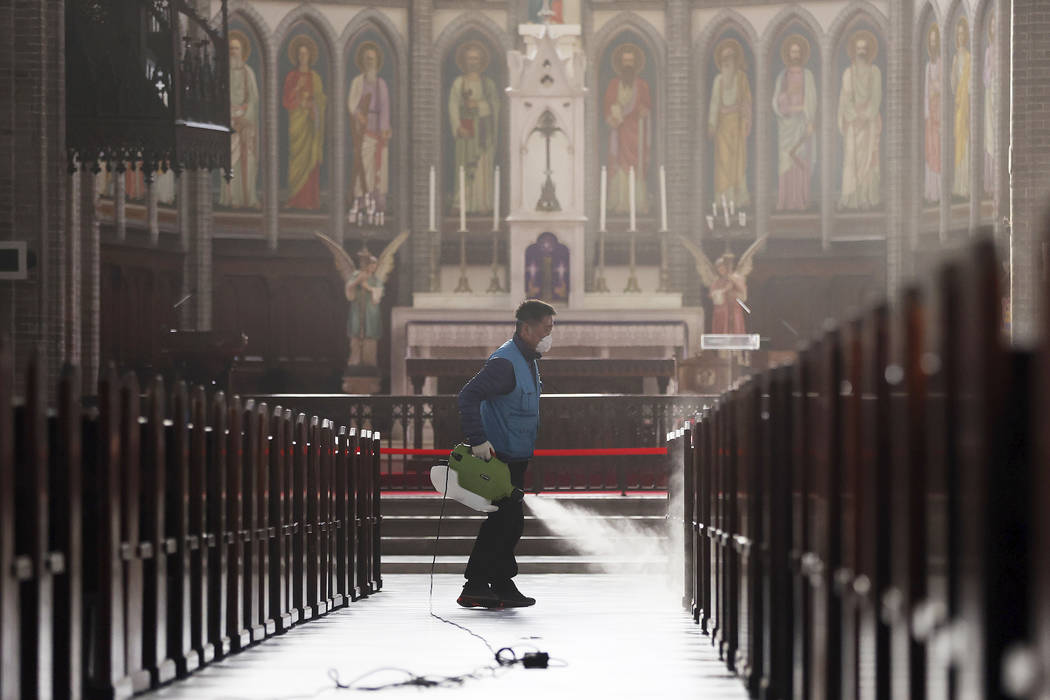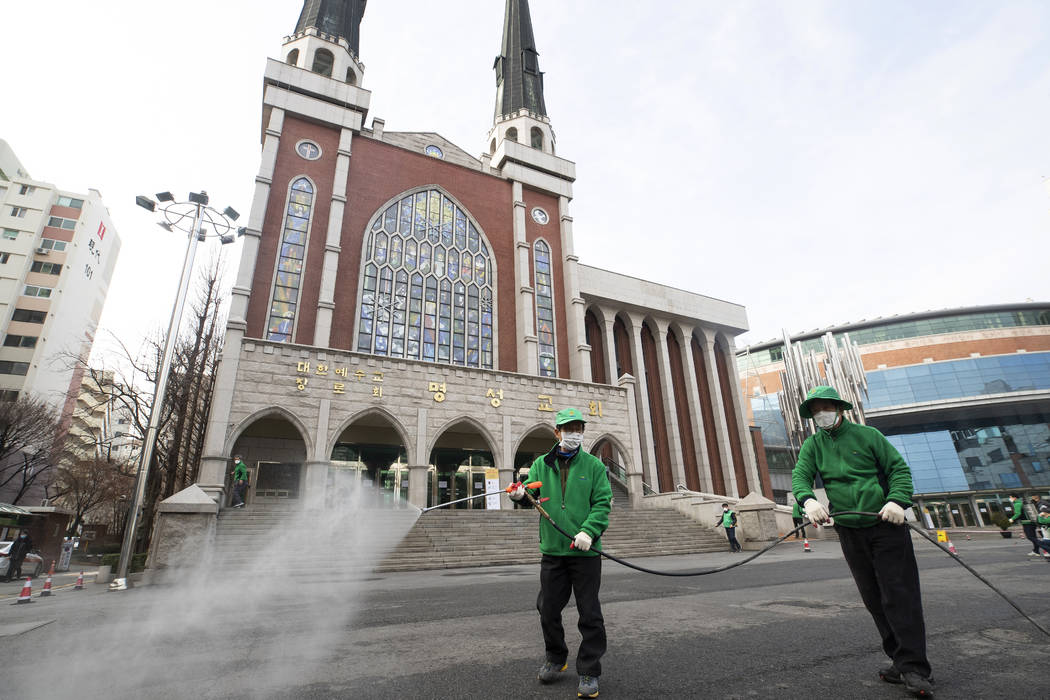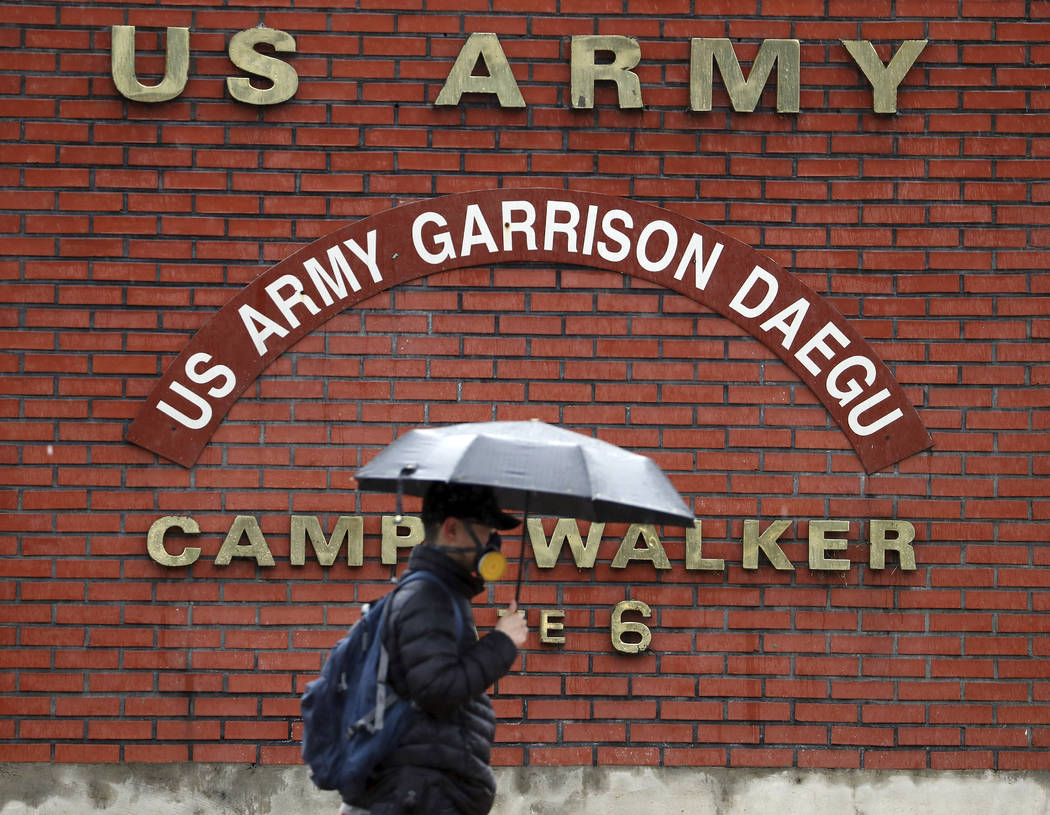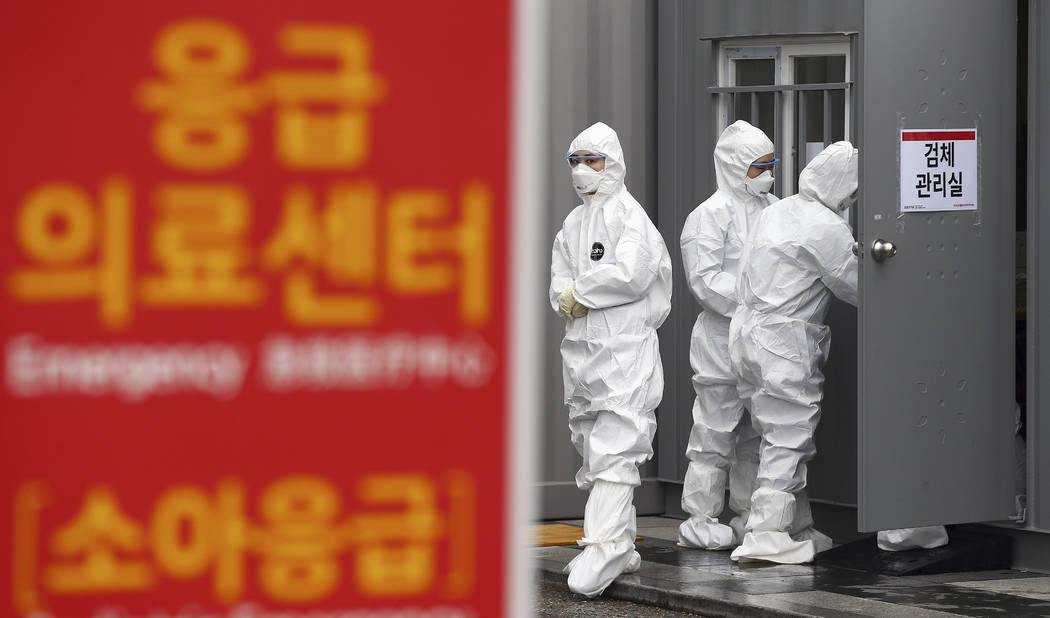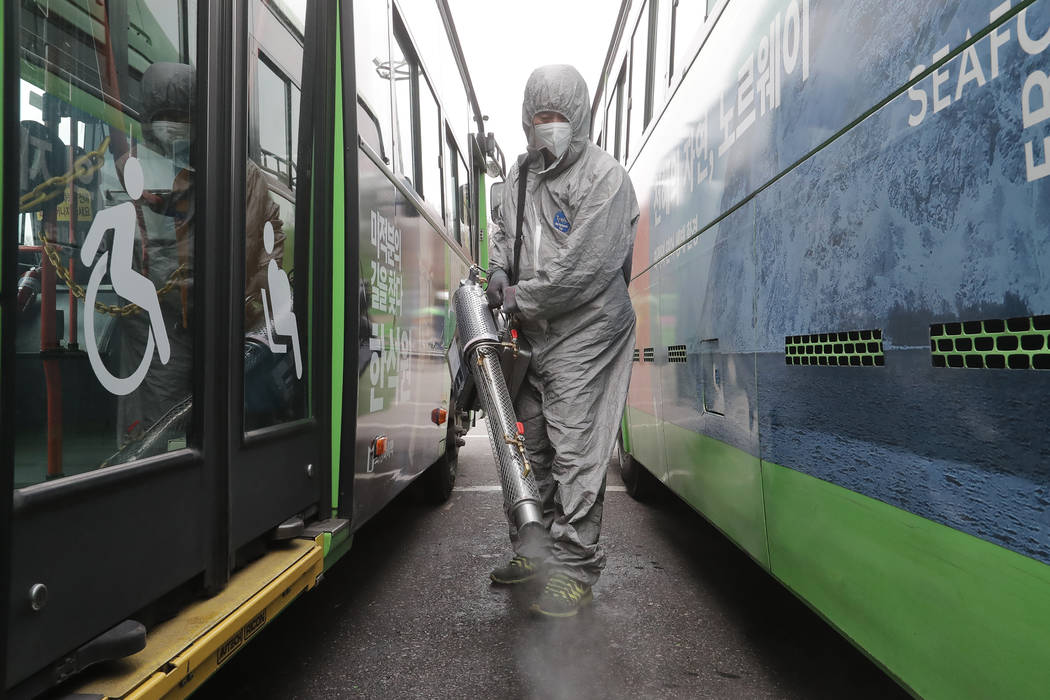World intensifies work to stop virus spread; deaths top 2.7K
SEOUL, South Korea — Crews scrubbed everything from money to buses, military bases were on high alert and quarantines were enforced Wednesday from a beachfront resort in the Atlantic to an uninhabited island in the Pacific as the world fought the spread of a new virus.
Worries over the ever-expanding economic fallout of the COVID-19 crisis multiplied, with factories idled, trade routes frozen and tourism crippled, while a growing list of countries braced for the illness to claim new territory. Even the Olympics, five months away, wasn’t far enough off to keep people from wondering if it would go on as planned.
“We don’t expect a miracle in the short term,” said Kianoush Jahanpour of the health ministry in Iran, where an official tally of infections of 139 was doubted by some who thought the problem was far bigger.
About 81,000 people around the globe were sickened by the coronavirus that kept finding new targets.
With Brazil confirming the arrival of Latin America’s first case, the virus had a toehold on every continent but Antarctica.
In Europe, where Germany, France and Spain were among the places with a growing caseload, an expanding cluster of more than 200 cases in northern Italy was eyed as a source for transmissions. In the Middle East, where cases increased in Bahrain, Kuwait and Iraq, blame was directed toward Iran. In Asia, where the crisis originated late last year in China, threats continued to emerge around the region, with South Korea battling a mass outbreak centered in the 2.5 million-person city of Daegu.
Though the virus pushed into countries both rich and poor, its arrival in places with little ability to detect, respond and contain it brought concern it could run rampant there and spread easily elsewhere.
“We’re going to be trying to slow down the spread so that our hospitals are not overwhelmed in one big gulp, one big hit,” said Ian Mackay, who studies viruses at the University of Queensland in Australia.
Global shares fell sharply once again Wednesday as fears over the speed of the new coronavirus around the world accentuated.
Trump sets news conference
President Donald Trump said he’ll discuss the coronavirus threat at a White House news conference Wednesday, a day after he sought to minimize fears of the virus spreading widely across the U.S.
Trump tweeted that representatives from the Centers for Disease Control and Prevention, and others, would join him at the late-afternoon appearance.
Trump and members of the administration have been sending mixed messages about the virus.
The CDC on Tuesday warned the American public to prepare for an an outbreak of the disease, which has spawned more than 80,000 cases around the world but relatively few so far in the U.S.
But before he flew home from India on Tuesday, Trump said the coronavirus situation is “very well under control in our country.” The administration has asked Congress for an additional $2.5 billion to speed development of a vaccine, support preparedness and response activities, and to gather needed equipment and supplies.
Republican and Democratic lawmakers alike have questioned whether the request is sufficient.
New York Sen. Chuck Schumer, the Senate Democratic leader, on Wednesday unveiled an $8.5 billion request to respond to the virus outbreak, more than triple Trump’s request. Schumer is asking for $4.5 billion for the Department of Health and Human Services to work to contain the outbreak in the U.S., $1 billion to develop and manufacture a vaccine, $1 billion to help other countries battle the coronavirus, and $2 billion to reimburse states for costs incurred in tackling the outbreak.
“We will put together a supplemental that will address this issue,” said Rep. Rosa DeLauro, D-Calif. Aides said the House measure is likely to be unveiled next week.
Disinfecting efforts
In South Korea, workers sanitized public buses, while in China, banks disinfected banknotes using ultraviolet rays. In Germany, authorities stressed “sneezing etiquette,” while in the United States, doctors announced a clinical trial of a possible coronavirus treatment.
Around the world, as Christians marked the start of the holy season of Lent with Ash Wednesday, worshipers found churches closed and rituals changed by virus fears. Even in St. Peter’s Square, many of those gathered for Pope Francis’ weekly audience wore face masks and clergy appeared to refrain from embracing the pontiff or kissing his ring.
Services in Singapore were broadcast online to keep people from crowded sanctuaries where germs could spread, bishops in South Korea shuttered churches for what they said was the first time in the Catholic Church’s 236-year history there, and in Malaysia and the Philippines, ashes were sprinkled on the heads of those marking the start of Lent instead of using a damp thumb to trace a cross of ashes.
“We would like to be cautious so that the coronavirus will not spread,” said the Rev. Victorino Cueto, rector of the National Shrine of our Mother of Perpetual Help in Manila in the Philippines.
Major gatherings were eyed warily, with organizers scrambling to respond in the face of the epidemic. Looming largest of all are the Olympic games, whose opening ceremonies are scheduled for July 24 in Tokyo. A member of the International Olympic Committee, Richard Pound, sounded alarms a day earlier, saying the virus could force a cancellation of the games. The Japanese government, in turn, gave mixed signals, insisting they would go forward yet urging that sports events now be curtailed.
Prime Minister Shinzo Abe called for major sports and cultural events in the coming two weeks to be canceled or postponed to stem further infections. Meanwhile, the top government spokesman said Olympics preparations would proceed and the games would go on as planned.
Concerns at military bases
Among the other crowded places that had officials worried: Military bases.
The South Korean military announced additional infections among its troops, with 20 cases on its bases and some 9,570 people in isolation. The U.S. military, which has 28,500 troops in South Korea, confirmed the first infection of an American soldier, a 23-year-old man based at Camp Carroll near Daegu, a day after Americans said a military spouse also had contracted the illness. Bowling alleys, movie theaters and a golf course on four American bases in the country were closed.
“This is a setback, it’s true, there’s no getting around that. But it’s not the end of the war,” Col. Edward Ballanco, commander of the U.S. Army Garrison Daegu told troops in a video message. “We are very well equipped to fight this thing off.”
Italy recorded 52 new infections on Wednesday and Greece became the newest country to see a case of the virus. South Korea announced 284 new cases, largely in Daegu, bringing its total to 1,261. China, still the epicenter of the crisis even as new outposts caught the world’s attention, reported 406 new cases and 52 more deaths. The country has a total of 78,604 cases of the virus and 2,715 fatalities.
China said Wednesday that those sickened by the virus included 555 prisoners who officials said likely became infected by guards using the same bus station as a nearby pulmonary hospital. In a twist, China is now heavily regulating arrivals from abroad, with authorities placing South Koreans under monitoring, state broadcaster CCTV reported, after five people on a flight showed signs of fever.
And Indonesia said it evacuated 188 crew members from the World Dream cruise ship and planned to take them to remote Sebaru Island. The workers were released from quarantine in Hong Kong after finding no infections, but authorities mandated an additional observation period.
University suspends study-abroad programs
The University of Wisconsin-Madison has suspended study-abroad programs with South Korea and China amid fears of the coronavirus.
University officials said in a statement Wednesday they had suspended the South Korean program. The move affects five students enrolled at Yonsei University and Korea University in Seoul.
The statement said the university made the move after the Centers for Disease Control and Prevention raised their warning levels to avoid non-essential travel to South Korea.
UW-Madison spokesman John Lucas said in an email the five students are returning to the United States. He said he didn’t know their individual destinations.
The university suspended its Chinese study-abroad program in late January. Seven students were not able to travel to the country as a result.
Fears over mass crackdown on ethnic Muslims
The spread of a new virus in China has deepened fears about the targets of a mass crackdown on ethnic Muslims in the far west of the country, human rights advocates said Wednesday.
The Uighur Human Rights Project released video and social media posts from China suggesting that many people are quarantined in their homes and unable to get food, creating a potential hunger crisis in a region under a government crackdown since April 2017.
Members of the group also expressed alarm about the potential spread of the new corona virus among the mass detention camps where the State Department says more than a million Uighurs and other ethnic Muslims are held without charge.
China has reported 555 cases of the virus among prisoners, though not yet from the detention camps in the Xianjiang region where witnesses say about 60 people are held per cell, so cramped together they are forced to sleep in shifts, and deprived of adequate food or medicine while being subjected to torture.



